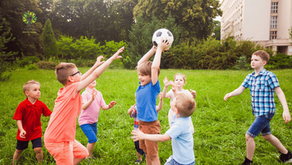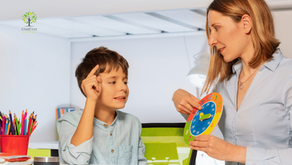10 Ways to Recognize and Reward Progress in ASD Children
- ChildFirst Behavior Therapy

- Mar 5, 2024
- 7 min read

Parenting a child with autism comes with unique challenges, but it's equally important to celebrate the progress and achievements of these exceptional individuals. Recognizing and rewarding the accomplishments of Children with ASD, such as those receiving support from an ABA therapist in Arlington Heights, IL, not only boosts their confidence but also enhances their overall well-being. Let’s explore the ten practical ways to acknowledge and celebrate the progress made by Children with ASD.
Positive Reinforcement
Positive reinforcement is an essential aspect of fostering a supportive environment for Children with ASD. In addition to verbal affirmations, incorporating tangible rewards tailored to the child's preferences can further enhance the effectiveness of positive reinforcement. These rewards may include favorite toys, additional playtime, or engaging activities that align with the child's interests. By personalizing the reinforcement process, caregivers and educators can establish a stronger connection with the child, reinforcing the notion that their efforts are not only recognized but also valued. Moreover, consistent and timely reinforcement helps build a positive association with desired behaviors, encouraging Children with ASD to generalize these behaviors across various situations. It's crucial to maintain open communication with the child to understand their evolving preferences and adapt the reinforcement strategies accordingly. This dynamic approach ensures that positive reinforcement remains a dynamic and motivating force in the child's developmental journey. Additionally, seeking guidance from an ABA clinic in Arlington Heights, IL, can provide specialized expertise to further tailor reinforcement strategies to the child's unique needs.
Visual Progress Charts
Designing visual progress charts tailored to the specific needs of an ASD child can be a valuable tool in promoting a sense of accomplishment and motivation. These charts serve as visual representations of achievements across different areas, including social interactions, academic performance, and self-care skills. Utilizing vibrant colors, symbols, or stickers associated with each accomplishment can enhance the child's visual appeal and engagement.
For social interactions, consider creating a chart that includes milestones such as initiating conversations, sharing, or participating in group activities. Academic progress can be tracked through a chart highlighting achievements in tasks like completing assignments, mastering specific subjects, or reaching educational goals. Additionally, for self-care skills, the chart may include accomplishments related to personal hygiene, dressing independently, or organizing personal belongings.
Personalized Certificates and Awards
Additionally, these personalized certificates and awards serve as lasting mementos that commemorate the child's hard work and dedication. Whether it's for academic achievements, extracurricular excellence, or personal growth milestones, these certificates become symbols of encouragement and motivation. Parents, teachers, and caregivers can collaborate to tailor the certificates to reflect the unique strengths and qualities of each child. This individualized approach not only fosters a sense of belonging but also encourages a positive self-image, instilling confidence that will benefit the child in future endeavors.

Moreover, the process of designing and presenting personalized certificates can be an interactive and engaging activity. Involving children in the creative process, such as choosing colors and themes or even drafting personal messages, enhances their sense of ownership and pride in their accomplishments. This collaborative effort reinforces the idea that achievements are celebrated as a shared success, strengthening the bond between educators, parents, and the child.
Celebratory Rituals
Furthermore, the introduction of celebratory rituals adds a dynamic and joyful dimension to the acknowledgment of a child's achievements. These rituals can take various forms tailored to the preferences and interests of the child. For instance, a small family dinner to commemorate a successful academic milestone, a weekend outing to a favorite park for athletic achievements, or a particular activity of the child's choice for personal accomplishments.
The deliberate creation of these rituals serves to reinforce the positive emotions associated with progress and success. By establishing a connection between achievement and celebration, children are encouraged to perceive their accomplishments as meaningful and worthy of recognition. This positive reinforcement not only boosts their self-esteem but also instills a sense of pride and confidence in their abilities.
Social Stories
In addition to personalized certificates and celebratory rituals, another impactful method for recognizing a child's achievements, especially in the context of best ABA therapy in Arlington Heights, IL, is the creation of social stories. These narratives provide a unique and engaging way to document and share the child's journey and accomplishments with family and friends. By weaving together words and illustrations, these stories become a powerful tool for building a supportive community that actively acknowledges and celebrates the child's progress.
Social stories serve a dual purpose by not only commemorating achievements but also aiding the child in understanding and navigating social situations. These narratives can explore the challenges overcome, the skills acquired, and the positive experiences gained throughout the child's developmental journey. Sharing these stories with peers, family members, and educators creates a sense of inclusivity and connection, fostering a supportive network that recognizes the child's unique strengths and accomplishments.
Peer Recognition
Encourage peer involvement in recognizing and celebrating the ASD child's achievements. This not only promotes a sense of belonging but also helps create a supportive social environment. Peers can contribute by offering words of encouragement, participating in celebratory activities, or even creating joint projects.
Flexible Goal Setting:
Moreover, adopting a strategy of flexible goal setting is instrumental in fostering a positive and resilient mindset in children. Begin by establishing realistic goals that align with the child's capabilities, taking into consideration their unique strengths and areas for growth. Breaking down large tasks into smaller, manageable steps ensures that goals are attainable, setting the stage for a series of successes.
It is paramount to emphasize the celebration of success at each stage of goal achievement. By acknowledging and appreciating progress along the way, the child learns to value the journey as much as the destination. This approach shifts the focus from the results alone to the importance of continuous improvement, instilling a sense of accomplishment and reinforcing the child's intrinsic motivation to persevere.
Interest-Based Rewards
Identify the child's interests and hobbies, then tailor rewards accordingly. Whether it's a new book, art supplies, or a favorite toy, aligning rewards with the child's passions enhances the significance of the recognition and creates a positive association with progress.
Family Involvement
Involve the entire family in recognizing and celebrating the child's achievements. This not only strengthens family bonds but also demonstrates a collective commitment to supporting the child's development. Regular family meetings or celebrations can be dedicated to acknowledging and applauding the child's progress.
Encouraging Self-Reflection
Foster a sense of self-awareness and reflection in the child by encouraging them to recognize and verbalize their progress. This can be achieved through discussions, journals, or even simple conversations about their daily experiences. Helping the child acknowledge their growth builds self-esteem and a positive self-image.
Conclusion
Celebrating the progress of Children with ASD is a crucial aspect of their development. By implementing these ten strategies, parents, educators, and caregivers can create a supportive and empowering environment that not only recognizes achievements but also encourages continuous growth and self-confidence in these remarkable individuals. If you are seeking additional guidance, support or ABA services in Arlington Heights, IL for your child with ASD, feel free to reach out to us at ChildFirst Behavior Therapy.
FAQs
What is positive reinforcement, and how does it benefit Children with ASD?

Positive reinforcement involves acknowledging and rewarding desired behaviors in Children with ASD and promoting a supportive environment. It boosts confidence, encourages positive associations with actions, and helps generalize these behaviors.
How can visual progress charts be used to celebrate achievements in different areas of an ASD child's life?
Visual progress charts serve as visual representations of achievements in social interactions, academics, and self-care. Using vibrant colors and symbols, they provide a tangible and engaging way to track and celebrate progress in various aspects of a child's development.
Why are personalized certificates and awards necessary in recognizing the accomplishments of Children with ASD?
Personalized certificates and awards serve as lasting mementos that celebrate a child's hard work and dedication. They foster a sense of belonging, encourage a positive self-image, and involve children in the creative process, enhancing their pride in their achievements.
How do celebratory rituals contribute to acknowledging a child's progress, and what forms can these rituals take?
Celebratory rituals add a dynamic and joyful dimension to acknowledging a child's achievements. These can include small family dinners, weekend outings, or special activities tailored to the child's preferences, reinforcing positive emotions associated with success.
What role do social stories play in recognizing and sharing an ASD child's achievements?
Social stories are narratives that document and share a child's journey and accomplishments through words and illustrations. They not only celebrate achievements but also aid the child in understanding and navigating social situations, fostering a supportive community.
Why is peer recognition important, and how can peers contribute to celebrating an ASD child's achievements?
Peer recognition promotes a sense of belonging and a supportive social environment. Peers can contribute by offering words of encouragement, participating in celebratory activities, creating joint projects, and actively engaging in the child's developmental journey.
How does flexible goal setting contribute to fostering a positive mindset in Children with ASD?
Flexible goal setting involves establishing realistic goals aligned with a child's capabilities and breaking them into manageable steps. Celebrating success at each stage encourages a positive and resilient mindset, emphasizing the importance of continuous improvement.
What is the significance of interest-based rewards in recognizing the progress of Children with ASD?
Identifying the child's interests and tailoring rewards accordingly enhances the significance of recognition. Whether it's a new book, art supplies, or a favorite toy, aligning rewards with passions creates a positive association with progress.
How can family involvement contribute to recognizing and celebrating the achievements of Children with ASD?
Involving the entire family strengthens bonds and demonstrates a collective commitment to supporting the child's development. Regular family meetings or celebrations can be dedicated to acknowledging and applauding the child's progress.
Why is encouraging self-reflection important in fostering a positive self-image in Children with ASD?
Encouraging self-reflection through discussions, journals, or conversations helps Children with ASD recognize and verbalize their progress. This builds self-esteem and a positive self-image, emphasizing the importance of personal growth.










Comments